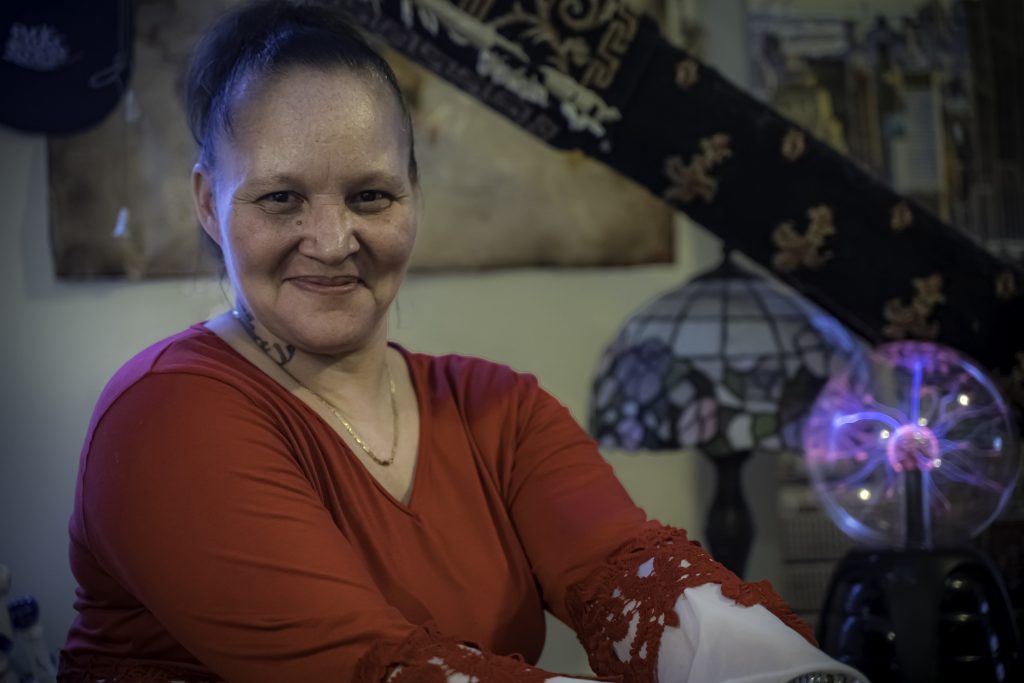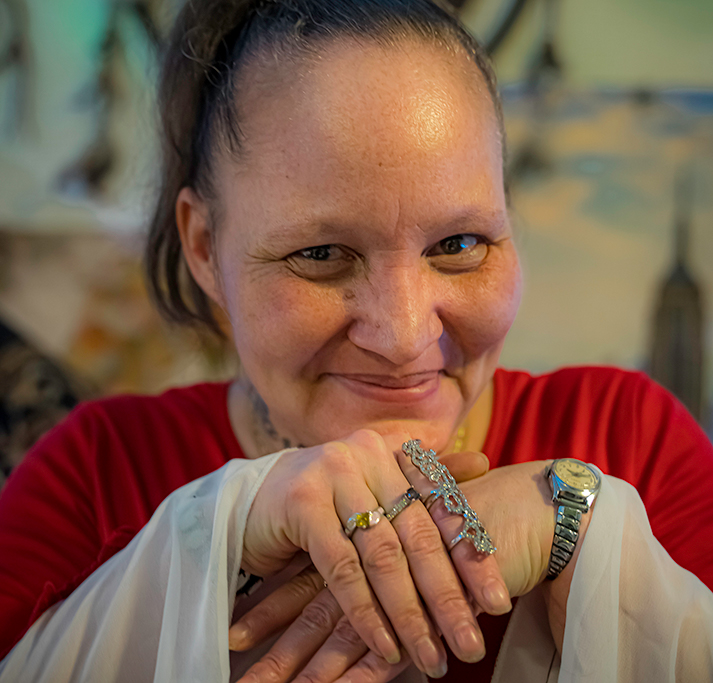Summer’s apartment gets more interesting the longer you look. While you can’t miss the mural-sized photo of a forest over her bed, other features reveal themselves slowly. Faucets trigger colored lights. Summer’s cat, Vertical, dashes behind furniture. Beneath the rug, there’s another mural, an underwater scene. Then there are the gadgets: a dancing robot, a remote-control car that drives on walls, a box that projects a mirage toy frog.
Likewise, Summer herself is full of surprises. Her stories often hinge on twists and end in punchlines:
“It was 1989 and it was my first time ever seeing snow… I went out, I was so excited. I was like ‘Oh my god, this is crazy! Look at the world, it looks so different!”
“And then I fell on my butt. I had the wrong shoes that day, boy. I had no clue, too— ‘ow, snow hurts.’”

Summer in her Plymouth apartment. (Photo by Jorge Lausell.)
Then, Summer was in her late teens. She had moved to Washington from her hometown of Oakland, California following a difficult situation at a group home. After a few years in Washington, she fell into homelessness.
“I was in the Jungle for 15 years… It was terrible, it was a mess, it was a nightmare. Luckily, drug court got a hold of me, so I just went along with that program, just totally stuck with it.”
They helped Summer find an apartment with Plymouth in 2010, but it took a while for what she’d gone through to fully sink in.
“It’s funny, for my first year I was clean, I got my one-year anniversary chip and I was like, ‘I just don’t feel different.’ And then, at 18 months exactly, I woke up and my brain went ting! And I swear it was like my vision cleared and I went, ‘What was I doing? Where was I?’”
“When I thought about all that dirt and then the sleeping in a tent in the night—oh, my god. That was danger. That was dangerous as hell… I don’t know how I did it.”
*****
Summer has lived at Plymouth for 9 years now. In her spare time, she enjoys shopping, but most of all she loves hanging out in her apartment.
“I don’t go nowhere, no-how, uh-uh… I’m not taking walks, I’m not going in the sunshine and bathing. Not no more, I spent fifteen years out there in that wilderness.”
At home, she decorates, spends time with her cat, and catches up on TV.
“Man, there’s so many choices, and I just lose my mind. Especially when you haven’t watched TV in 15 years! I’m like: What’s going on here? Who in the what is that?”

(Photo by Jorge Lausell.)
Now, Summer can’t imagine living anywhere else—she makes jokes about the incredible lengths somebody would have to go to make her move. And part of what makes Plymouth the right fit is the supportive, accepting staff.
“It’s a great place, and I don’t have any complaints. I just see ups and downs of years and years of being here… Now, I don’t want a regular place. You couldn’t pay me to go, because it’s lonesome! If I was in a regular place, I’d be lonesome. There’s nothing to do, nobody to pick on,” she jokes, “nobody with common interests. I mean, around here, I’m a big fish. There, I’d be, like, socially unacceptable.”
“[The case managers] are very open-minded, very cool, very willing to listen… They’re sweet, they don’t make you feel uncomfortable. That’s how they all are.”
“I’ve had my slipups, I’ve had a couple of them. But then the staff worked with me, I went to treatment… It was great to have some place that gave me an opportunity when I screwed up to get right again instead of losing my housing immediately.”
When asked what she would say to a Plymouth supporter, Summer, who is usually so quick to speak, needed a few seconds to find the right words.
“Maybe I have not met my full potential in life or what I could’ve been because of choices I had made, but for me to have somewhere to go and still be acceptable and loved—maybe I will go a little bit higher and farther than I was. I definitely would not be healthy and eating food and in a good place. I mean, I could be dead… The support that is given here—you saved my life.”